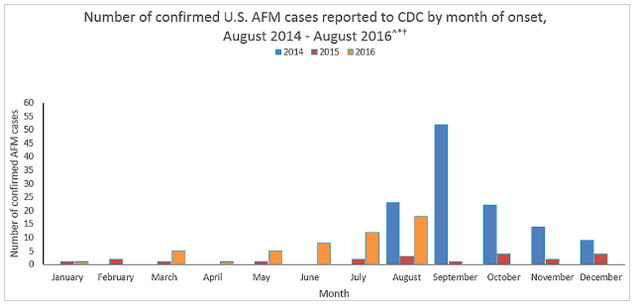Will the Current Surge of AFM Reach 2014 Levels?
By Jessica Taylor via Multibriefs
The Centers for Disease Control and Prevention (CDC) confirmed 50 cases this year of acute flaccid myelitis (AFM) in 24 states as of Aug. 31, 2016 — nearly double the number from 2015 when 21 cases were reported for the whole year. Health officials nationwide are worried that the rising number of cases of the mysterious, polio-like illness could reach the level of 2014, when AFM paralyzed 120 children.
Though the total number of cases has not been confirmed, the Washington Post stated that "conversations and emails with physicians around the country indicate that at least four cases have occurred in California and at least three in Massachusetts, and that others have been seen in Florida, Texas, Pennsylvania and New York, as well as Virginia."
In any case, it's never too early for health practitioners to be alert for signs of any symptoms of AFM.
"You hate to be an alarmist, but there's reason to have some concern," Avindra Nath, M.D., National Institute of Neurological Disorders and Stroke said.

So what is AFM?
According to the CDC, AFM is a "rare illness that anyone can get. It affects a person's nervous system, specifically the spinal cord. AFM can result from a variety of causes, including viral infections."
The CDC indicates health practitioners should report to their state or local health department about anyone with a sudden neurologic illness that's associated with limb weakness, while also reporting patients who meet the case definition regardless of lab results.
How do you know if your patient has AFM?
The disease, which is mainly affecting children, has been linked to a strain of enterovirus — typically circulating between the months of August and October. Commonly causing milder illnesses in children, enteroviruses can become more serious (inflammation to the brain) when entering the central nervous system. AFM can also be caused by West Nile Virus and adenoviruses.
Most patients will have sudden limb weakness and loss of muscle tone and reflexes, while others may experience facial droop/weakness, difficulty moving the eyes, drooping eyelids, difficulty swallowing or slurred speech, difficulty passing urine, weak breathing or pain in arms and legs.
In order to be a confirmed case, your patient must meet the following criteria:
- A patient must have acute onset of focal limb weakness, and
- An MRI showing a spinal cord lesion largely restricted to gray matter and spanning one or more spinal segments.
For your patient to have a probable case, he/she must meet the following criteria:
- Acute onset of focal limb weakness, and
- Cerebrospinal fluid (CSF) with pleocytosis
With careful examination of the nervous system, health practitioners should be able to tell the difference between AFM and other diseases. The CDC states MRIs have been helpful in diagnosing cases, as well as testing nerve response.
Though there's no specific treatment for AFM, Prozac and physical therapy have been helpful. That said, a neurologist may recommend other interventions on a case-by-case basis. And since there are no vaccines for enterovirus, it's always a good plan to reiterate to your patients that good hygiene is the best defense.
As health practitioners continue to stay alert on the issue, the CDC is trying to get to the root of the disease as they test specimens from patients looking for the pathogens that could be the trigger. They're also taking a closer look as to what was occurring in 2014 when the flood of AFM cases occurred.
Jessica Taylor is the medical editor for MultiBriefs and has been a journalist and writer for more than 10 years. Jessica received her bachelor's degree in communications with a dual concentration in media studies and journalism from Virginia Wesleyan College. She’s been awarded first place in headline writing from the Virginia Press Association and an honorable mention for design and content from the Society of Collegiate Journalists.
|
